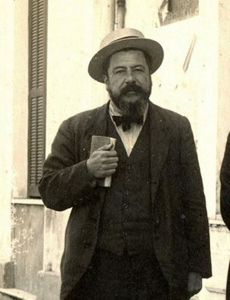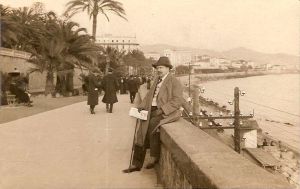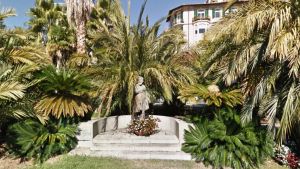Mayor, Lawyer and Member of Parliament
 Orazio Raimondo was born in Sanremo on 6th June 1875. He was the son of Stefano, originally from Val Nervia, a well-known lawyer and Luigia Corradi.
Orazio Raimondo was born in Sanremo on 6th June 1875. He was the son of Stefano, originally from Val Nervia, a well-known lawyer and Luigia Corradi.
From a young age he dedicated himself intensely to his studies, obtaining his high school diploma at the "Gian Domenico Cassini" classical high school in Sanremo. During the years when I was attending university in Genoa, he approached the socialist movement.
He returned to Sanremo in 1895, having previously obtained a degree in law, he devoted himself to the profession of lawyer.
In 1896, following the victory in the administration of the socialist list and the election of Augusto Mombello as mayor, he temporarily became editor of the newspaper "La parola dei socialisti sanremesi". In 1898 he ran for the local elections becoming a minority councillor and finally a councillor in the new elections of 1902 following the new victory of the Socialists of Mombello.
In the local elections of July 1906 the list of the Italian Socialist Party of the lawyer Orazio Raimondo obtained the victory.
Raimondo was proclaimed mayor during the first meeting.
One of the main points of his administration's programme was the continuation of the work already begun by the Mombello junta between 1902 and 1906, including the widening of the city's east and west avenues, the restoration of the Umberto I barracks, the construction of the new barracks at San Martino and the construction of the carriage road to San Romolo to encourage the development of agricultural activities.
Other objectives in his programme were the municipalisation of the aqueduct, the entrusting of the new management of the Casino and the completion of the tramway line between Sanremo, Taggia and Ventimiglia. The municipalisation of the aqueduct was then actually carried out by means of a contract signed on 25 May 1907 with the engineer Ernesto Marsaglia, which sanctioned the transfer of the drinking water company owned by the Marsaglia family to the Municipality.
Another important initiative taken by Raimondo during his term of office as mayor of Sanremo was that of having attempted to strengthen the railway connections between Lower Piedmont and the Riviera di Ponente by proposing to build a new railway line connecting these two regions through the Argentina valley, a project which, however, would remain on paper.
Under Raimondo's administration, the first permanent cinema was erected on 20 May 1906 in the grounds of the Hotel Eden.
 On 14 April 1907, the first edition of the Milan-San Remo cycling race was organised, won by the French rider Lucien Petit Breton.
On 14 April 1907, the first edition of the Milan-San Remo cycling race was organised, won by the French rider Lucien Petit Breton.
The last phase of his administration would be marked by other important events, including, in 1908, the National Congress of Hydrology and Climatology, attended by some of the most important Italian doctors and climatologists, the inauguration of the Nuñez del Castillo children's hospital in a building designed by the engineer Pietro Agosti, and finally, on 26 April 1908, the inauguration of the monument to Giuseppe Garibaldi by the sculptor Leonardo Bistolfi, in the presence of over twenty thousand people, including many Garibaldi veterans and representatives of Italian and French fighting associations, Ligurian socialist circles and various Masonic lodges.
In June 1908 his resignation would lead to new elections, won by Alfredo Natta Soleri's Constitutional Party; the defeat was partly due to accusations that his administration had squandered the public treasury.
In October he was also beaten in the by-election for the Sanremo constituency, called following Biancheri's death. However, the electoral campaign was characterised by a great deal of violence, and one of the causes of his failure to be elected was probably his admission of membership of the Freemasons and the divisions within his party.
In March 1909 he was again defeated by the engineer Giuseppe Marsaglia (by 1634 votes to 3540) in the political elections.
Having reaffirmed his adherence to Freemasonry in 1912, Raimondo enjoyed a particularly successful and rewarding year in 1913. In October he was finally elected deputy in the Sanremo-Ventimiglia constituency, thanks to the same coalition that had enabled him to become mayor of the city of flowers.
On 6 December 1913, at the first session of Parliament, he gave a memorable speech to the Chamber in response to the Crown's speech, so much so that Prime Minister Giolitti himself, to whom the reply was addressed, expressed a desire to meet him personally. In the same year he would take on the defence of the socialist councillor of Savona, Giuseppe Garibaldi, in the libel trial brought against the trade unionist paper "Battaglie sindacali", which had accused him of being the keeper of a number of brothels.
However, he was forced out of the Socialist Party after the congress in Ancona (26-29 April 1914), following the approval of a motion in favour of expelling the Freemasons from the party under pressure from Mussolini, and despite the opposition of Raimondo himself and Giovanni Lerda. On that occasion, tearing up his PSI membership card, he said: «I do not choose, I remain what I am». He had in fact been initiated many years earlier into the San Remo "Giuseppe Mazzini" lodge, of which he had become the venerable master in 1905.
The outbreak of the First World War was to sharpen the gap between Raimondo, entrenched in a clearly interventionist position, and the Italian Socialist Party, openly in favour of neutrality. Raimondo supported the reasons for the Entente's 'liberal war' and the practical impossibility of our country refraining from a clash that would have put it in a grain and coal supply crisis.
On this line he also spoke in favour of the national loan and the first steps of the Italian air force.
Between May and June 1917 he went on a mission to Russia, together with Arturo Labriola, Innocenzo Cappa and Giovanni Lerda, to try to convince Kerensky not to leave the conflict.
After joining the Parliamentary Fascio for National Defence in December 1917, with the aim of pushing the Orlando government to adopt stricter measures to ensure an energetic conduct of domestic policy and war, on 12 January 1918 he was called to join, together with some generals, Senator Paolo Emilio Bensa and the Honourable Alessandro Stoppato, the Commission of Enquiry set up to investigate the causes and responsibilities of the defeat at Caporetto. In this capacity, he was also suspected of having exerted pressure to clear alleged Freemasonry affiliates involved in the October 1917 rout.
In fact, the most influential of these, General Luigi Capello, ended up being removed from command of the 5th Army, which had been entrusted to him to organise the recovery of the Italian army after Caporetto, and suspended from duty.
Towards the end of the conflict he undertook to disseminate Wilsonian ideas as a basis for the peace treaty, but later refused to participate in the international commission to establish responsibility for the war.
In 1919, he stood in the parliamentary elections again, promoting a bloc that could bring together the votes of nationalists and ex-combatants, and succeeded in being elected together with the lawyer Celesia from Vegliasco. During the electoral campaign he was allegedly prevented from speaking by some squadrists, who interrupted one of his rallies in Genoa.
Also in 1919 he founded the independent newspaper "L'Azione" in Genoa, in whose columns he is said to have supported D'Annunzio's enterprise at Fiume, publishing the constitution drawn up in September 1920 by Alceste De Ambris (the so-called "Carta del Carnaro"). The newspaper, in which Ungaretti also wrote, would have benefited from the financial support of some well-known industrialists of the time, including Erasmo Piaggio and Attilio Odero.
In 1919 Raimondo also managed to obtain substantial funding for the establishment of an experimental floriculture station in his home town, which was then effectively recognised by royal decree on 25 January 1925 and entrusted to the direction of Professor Mario Calvino, father of the writer Italo.
Sick and precociously in decline, he died on the morning of 11th January 1920 in his house in Corso Umberto (today corso Mombello).
At the solemn funeral, which was attended by over twenty thousand people, Innocenzo Cappa gave the official oration, while the notary Bartolomeo Badino started the collection of funds for the erection of a memorial, later created by the sculptor Leonardo Bistolfi and inaugurated on 21st February 1960 by the mayor Secondo Anfossi in the gardens of Corso Trento Trieste.
After his sudden death his brother Riccardo Raimondo took up his inheritance and was elected a member of parliament in the Italian political elections of 1921 on behalf of the P.N.F. list (Partito Nazionale Fascista), he became part of the National Blocks.
A few years later a street in the city of Sanremo was named after him and later the Stazione Sperimentale di Floricoltura in Sanremo was also named after Orazio Raimondo.
(texts: partly taken from a text by Andrea Gandolfo; partly from Wikipedia; images from personal archive)




